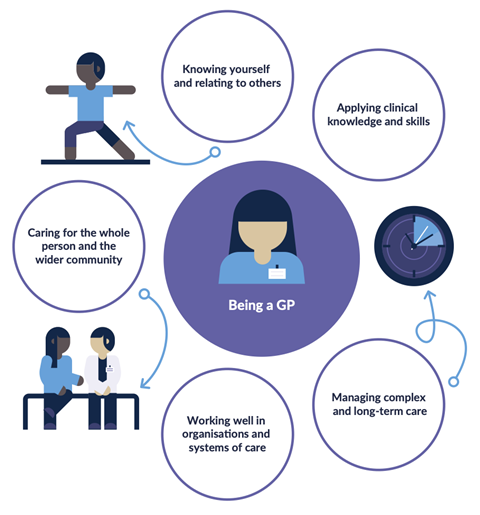The Structured Teaching Programmes (STP) are run by the Primary Care Medical Educators (PCME) to deliver content relevant to the RCGP Curriculum. It is supplemntary to, and not a replacement for, on-the-job learning during placements. We try to focus on areas that may be harder to gain exposure to, as well as looking at content useful for recording in the portfolio, as well as preparation for the MRCGP examinations.
Attendance is built into job plans as part of the allocated educational time each week. NHS England and the Lead Employer consider the STP as part of the paid time during a week.
Required Training
Find out more about training we provide that is necessary as part of your journey to gaining MRCGP
More InfoWhich teaching should I attend?
In general, you should attend teaching sessions that correspond with your current grade (ST1, ST2 or ST3). More senior trainees who have missed past sessions are welcome to attend any session they wish as long as this is agreed with their ES and fits in their job plan.
What teaching is provided?
In ST1, 18 sessions are provided on selected Thursday afternoons. In ST2, 20 sessions are provided in two 10-session semesters on selected Tuesday afternoons. ST2-A and ST2-B can be sat in either order depending on whether trainees enter in February or August.In ST2, trainees are also invited to attened a Consultation Skills course which runs in addition to the main teaching programme during one of the semesters.In ST3, trainees are provided with a minimum of 50 sessions of teaching (25 days) spread across Wednesdays. The programme caters for entry in both February and August.
How many sessions am I expected to attend?
Teaching sessions are provided for some of the allocated time in your job plan for educational time, and thus form part of your contract. Attendance is mandatory, and should be considered with the same gravity as clinical sessions. When on hospital posts with on-call rotas, it is understood and acceptable that trainees may need to miss sessions to perfrom clinical duties or comply with madatory rest requirements (i.e. zero days and post-nights).
Trainees on annual leave are not expected to attend, but should ensure their ES is aware of planned leave in advance. Our attendance policy is visible here.
I am a LTFT/out-of-sync trainee, when should I move to ST2/ST3 teaching?
We recommend staying with ST1 teaching until you have completed your ST1 posts. If you are LTFT, you will have technically “overattended” sessions in the initial part of your training (i.e. a trainee at 80% should technically leave teaching sessions after 80%, which is obviously absurd!), so you will owe time back to either clinical roles or your own time. You can complete this time in the last months of your ST1 post.
ST2 and ST3 have start points in February and August each year, so we recommend joining at either of these times, as close as possible to when you change from ST1/ST2 to ST2/ST3. As teaching takes place on different days, this will require planning and negotiation with your current post to ensure it can be managed.
You should spend 12 months full-time equivalent in each teaching group.
Please email the relevant PCME in advance of your planned switch date so we can ensure you recieve emails reminders and invites for sessions.
How is attendance recorded?
Trainees should complete the register provided in all teaching sessions. This will be taken at the advertised start time of the session. Late arrival or early departure will be logged as non-attendance. The register is maintained by Lisa Diamond in the Postgraduate Education office.
Periodically we will share this record with Educational Supervisors to enable them to update the ESR for Lead Employer monitoring, which is why it is important that your ES is the one made aware if you can’t attend or were late.
However, the most comprehensive register of attendance is maintained by trainees themselves, by completing a portfolio entry for each session attended. We recommend this for several reasons: to consolidate learning, to ensure trainees demonstrate curriculum coverage, and to provide evidence of attendance in case of dispute. If a trainee fails/forgets to mark attendance on a register, or is late, it can be clearly seen on their portfolio whether they did, in fact attend.
Can I do something else instead of attending teaching?
In theory, you are able to use educational time for your own educational work, as long as this is agreed with your ES or the TPD in advance. Examples might include educational courses, specialist tutorials or essential training elsewhere. Educational time cannot be used as default “free time” in which to book personal appointments or leisure time (unless already approved as annual leave). Nevertheless, the Structured Teaching programmes are carefully curated to complement the on-the-job learning in order to meet your curriculum needs so you would need to clearly evidence what need is being met by doing something else..
Preparation for any exam would not be considered an appropriate use of alternative educational time.
The GP Resident Doctor job contract pays trainees for educational time, and trainees should therefore be prepared to produce evidence of how the hours allocated to training have been used (usually via e-portfolio). Inappropriate use of educational time may be considered a probity and fitness to practice issue.
Areas of Capability

In 2019 the RCGP developed a new capability framework based on five capabilities – each of which incorporate some of the previous 13 capabilities (or competencies):
- Knowing Yourself and relating to others: fitness to practice, communication and consultation, maintaining and ethical approach.
- Applying skills and clinical knowledge: Data gathering and interpretation, clinical examination and procedural skills, making a diagnosis and clinical management
- Managing Complex and long-term care: managing medical complexity and working with colleagues and in teams.
- Working well in organisation and systems of care: Improving performance, learning and teaching and organisation management and leadership.
- Caring for the whole person and the wider community: Practising holistically and Community orientation.
We have mapped these Capabilities to the structured teaching programmes for each of the ST1, ST2 and ST3 grades.
You can read more about the curriculum development in this InnovAIT article here:
Page last reviewed: 21 January 2026


